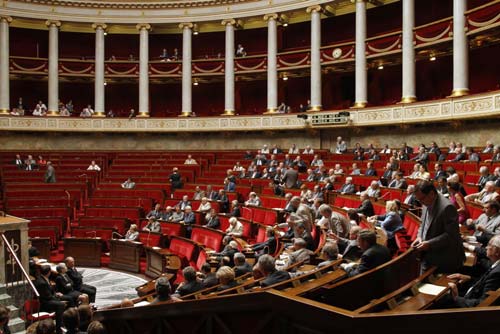-
News >World
French Senate passes ban on full Muslim veils
2010-09-15 07:02PARIS - The French Senate on Tuesday overwhelmingly passed a bill banning the burqa-style Islamic veil on public streets and other places, a measure that affects less than 2,000 women but that has been widely seen as a symbolic defense of French values.
The Senate voted 246 to 1 in favor of the bill in a final step toward making the ban a law - though it now must pass muster with France's constitutional watchdog. The bill was overwhelmingly passed in July in the lower house, the National Assembly.
Many Muslims believe the legislation is one more blow to France's No. 2 religion, and risks raising the level of Islamophobia in a country where mosques, like synagogues, are sporadic targets of hate. However, the law's many proponents say it will preserve the nation's values, including its secular foundations and a notion of fraternity that is contrary to those who hide their faces.
In an attempt to head off any legal challenges over arguments it tramples on religious and other freedoms, the leaders of both parliamentary houses said they had asked a special body to ensure it passes constitutional muster. The Constitutional Council has one month to rule.
The bill is worded to trip safely through legal minefields. For instance, the words "women," "Muslim" and "veil" are not even mentioned in any of its seven articles."This law was the object of long and complex debates," the Senate president, Gerard Larcher, and National Assembly head Bernard Accoyer said in a joint statement announcing their move. They said they want to be certain there is "no uncertainty" about its conforming to the constitution.
France would be the first European country to pass such a law, though others, notably neighboring Belgium, are considering laws against face-covering veils, seen as conflicting with the local culture.
"Our duty concerning such fundamental principles of our society is to speak with one voice," said Justice Minister Michele Alliot-Marie, opening a less than 5-hour-long debate ahead of the vote.
The measure, carried by President Nicolas Sarkozy's conservative party, was passed by the lower house of parliament, the National Assembly, on July 13.
It would outlaw face-covering veils, including those worn by tourists from the Middle East, on public streets and elsewhere. The bill set fines of euro150 ($185) or citizenship classes for any woman caught covering her face, or both. It also carries stiff penalties for anyone, such as husbands or brothers, convicted of forcing the veil on a woman. The euro 30,000 ($38,400) fine and year in prison are doubled if the victim is a minor.
The bill is aimed at ensuring gender equality, women's dignity and security, as well as upholding France's secular values - and its way of life.
Some women, like Kenza Drider, have vowed to wear a full-face veil despite a law. Drider says she prefers to flirt with arrest rather than bow to what she says is an injustice.
"It is a law that is unlawful," said Drider, a mother of four from Avignon, in southern France. "It is ... against individual liberty, freedom of religion, liberty of conscience," she said.
"I will continue to live my life as I always have with my full veil," she told Associated Press Television News.
Drider was the only woman who wears a full-faced veil to be interviewed by a parliamentary panel that spent six months deciding whether to move ahead with legislation.
Muslim leaders concur that Islam does not require a woman to hide her face. However, they have voiced concerns that a law forbidding them to do so would stigmatize the French Muslim population, which at an estimated 5 million is the largest in western Europe. Numerous Muslim women who wear the face-covering veil have said they are being increasingly harassed in the streets.

